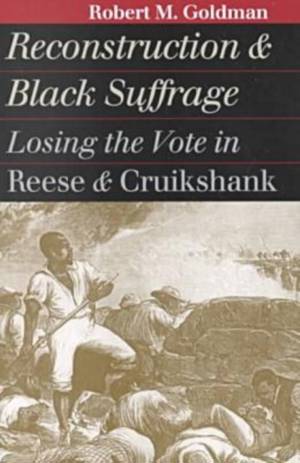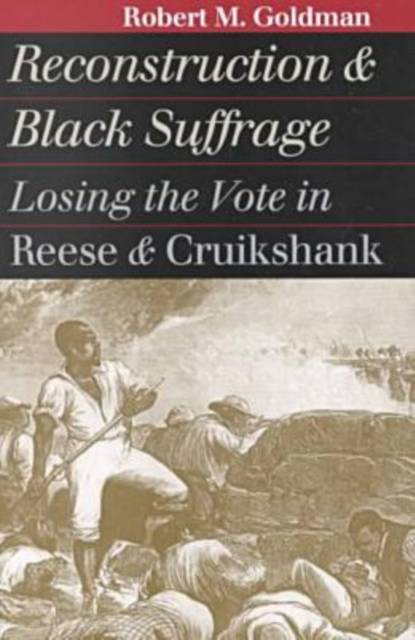
- Retrait gratuit dans votre magasin Club
- 7.000.000 titres dans notre catalogue
- Payer en toute sécurité
- Toujours un magasin près de chez vous
- Retrait gratuit dans votre magasin Club
- 7.000.000 titres dans notre catalogue
- Payer en toute sécurité
- Toujours un magasin près de chez vous
42,45 €
+ 84 points
Description
On Easter Sunday in 1873, more than one hundred black men were gunned down in Grant Parish, Louisiana, for daring to assert their right to vote. Several months earlier, in Lexington, Kentucky, another black man was denied the right to vote for simply failing to pay a poll tax. Both events typified the intense opposition to the federal guarantee of black voting rights. Both events led to landmark Supreme Court decisions. And, as Robert Goldman shows, both events have much to tell us about an America that was still deeply divided over the status of blacks during the Reconstruction era. Goldman deftly highlights the cases of United States v. Reese and United States v. Cruikshank within the context of an ongoing power struggle between state and federal authorities and the realities of being black in postwar America. Focusing especially on the so-called Reconstruction Amendments and Enforcement Acts, he argues that the decisions in Reese and Cruikshank signaled an enormous gap between guaranteed and enforced rights. The Court's decisions denied the very existence of any such guarantee and, further, conferred upon the states the right to determine who may vote and under what circumstances. In both decisions, lower court convictions were overturned through suprisingly narrrow rulings, despite the larger constitutional issues involved. In Reese the Court justified its decision by voicing only two sections of the Enforcement Acts, while in Cruikshank it merely voided the original indictments as being "insufficient in law" by failing to allege that the Grant Parish murders had been explicitly motivated by racial concerns. Such legalistic reasoning marked the grim beginning of a nearly century-long struggle to reclaim what the Fifteenth Amendment had supposedly guaranteed. As Goldman shows, the Court's decisions undermined the fledgling efforts of the newly formed justice department and made it increasingly difficult to control the racial violence, intimidation, poll taxes, and other less visible means used by white southern Democrats to "redeem" their political power. The result was a disenfranchised black society in a hostile and still segregated South. Only with the emergence of a nationwide civil rights movement and the Voting Rights Act of 1965 did things begin to change. Readable and insightful, Goldman's study offers students, scholars, and concerned citizens a strong reminder of what happens when courts refuse to enforce constitutional and legislated law--and what might happen again if we aren't vigilant in protecting the rights of all Americans.
Spécifications
Parties prenantes
- Auteur(s) :
- Editeur:
Contenu
- Nombre de pages :
- 200
- Langue:
- Anglais
- Collection :
Caractéristiques
- EAN:
- 9780700610693
- Date de parution :
- 27-02-01
- Format:
- Livre broché
- Format numérique:
- Trade paperback (VS)
- Dimensions :
- 140 mm x 216 mm
- Poids :
- 235 g







